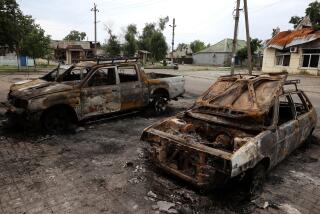To the Brink: What an Ugly War : Failure to curb chemical-weapon proliferation may hit home during Iraq crisis
- Share via
When the Arab League meets today in emergency session, the world will wait and hope for something more to result than some bush-league communique. Don’t hold your breath. The Arab League has been no more effectual than any other regional organization in dealing firmly with the misconduct of a member. So far it has done little to resolve the current crisis with Iraq. At the moment at least, any solution seems more likely to arise out of military force rather than reason, goodwill or the net effect of Arabs united against Iraq.
Resolving an international crisis with military force is particularly risky in this age of apocalyptic weaponry. For while the advanced powers have nuclear weapons, less developed ones can resort to chemical weapons of the kind with which Baghdad now menaces the troops of the anti-Saddam Hussein coalition. Iraq, after all, used both mustard and nerve gas against Iranian troops during their long war and, later, against its own Kurdish population. In each of these cases, chemical weapons were deployed against technically inferior opponents with no ability to retaliate. In each case, the world turned a blind eye to the atrocity for the sake of “larger interests.”
At the same time, certain of the industrialized nations continued to sell technology and materials to nations obviously in the process of building chemical arsenals. As a result, chemical weapons, which are relatively inexpensive and easy to produce, have come to be regarded in some parts of the Third World as a “poor man’s atom bomb.”
Horrific as they are, however, chemical weapons present a manageable military threat to well-prepared, well-equipped troops, such as those of the United States. Moreover, they never have been employed against a civilian population whose government retained a capacity to retaliate.
The world’s historic mistake in failing to restrain the proliferation of chemical weapons will be a complicating, though not decisive, factor in resolving the gulf crisis. Despite international prohibitions on their use, chemical warfare has not been as rare as the revulsion it provokes would suggest. In the 1930s, Italy used gas against the Ethiopians, and Japan employed it against the Chinese and some Pacific Islanders. In the 1960s, Egypt used gas in Yemen, and Libya used it in Chad during the 1980s. The Vietnamese may have used chemical agents in Cambodia and the Soviets are suspected of it in Afghanistan. Now, Iraq may use it again. History’s pigeons have a way of coming home to roost.
More to Read
Sign up for Essential California
The most important California stories and recommendations in your inbox every morning.
You may occasionally receive promotional content from the Los Angeles Times.













